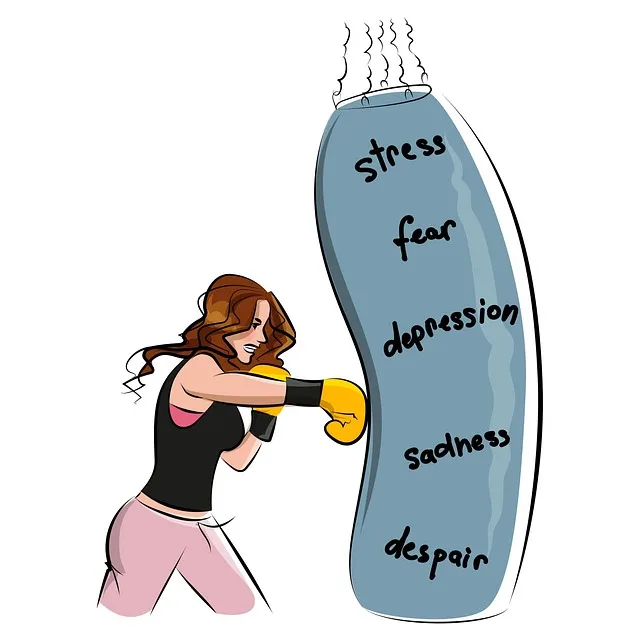Kaiser Permanente in Denver prioritizes employee mental well-being through Resilience, Flexibility, and Mindfulness (RFM) programs, offering stress management workshops and integrated meditation techniques. These initiatives aim to enhance job satisfaction, reduce burnout, and improve patient care for mental health professionals, addressing a critical need in the healthcare sector, especially for those seeking Kaiser Permanente mental health jobs Denver offers. RFM exercises, accessible through structured guides, empower individuals to build resilience against life's challenges, aligning with Denver's dynamic landscape and the growing demand for comprehensive mental health services within the community.
“Discover how Resilience, Flexibility, and Mindfulness (RFM) exercises are transforming mental health support. This article explores the powerful impact of RFM on Kaiser Permanente Denver’s approach to employee wellness, specifically tailored for mental health professionals. Learn from their success story and a step-by-step guide to implementation. Understand why these techniques are valuable assets for any mental health job seeker in the Denver area, enhancing both personal growth and professional performance.”
- Understanding RFM and Its Impact on Mental Health Support
- Kaiser Permanente Denver's Approach to Resilience Training
- The Benefits of RFM for Mental Health Professionals
- Implementing RFM Exercises: A Step-by-Step Guide
- Real-World Success Stories: Kaiser Permanente's Experience
Understanding RFM and Its Impact on Mental Health Support

Understanding RFM (Resilience, Flexibility, and Mindfulness) is paramount when implementing resilience-building exercises, especially in supportive settings like Kaiser Permanente mental health jobs in Denver. This framework empowers individuals to navigate life’s challenges with enhanced adaptability and emotional equilibrium. RFM techniques, such as mindfulness meditation, are integral to fostering mental well-being within the workforce. By integrating practices like these into Mental Health Education Programs Design, organizations can create environments that not only support employees’ mental health but also promote overall job satisfaction and productivity.
Moreover, Stress Management Workshops Organization can benefit immensely from RFM concepts. These workshops can teach participants effective strategies to manage stress, improve focus, and cultivate a positive mindset. Incorporating mindfulness meditation into the curriculum allows individuals to develop coping mechanisms that are both scientifically proven and easily accessible. Such initiatives contribute to a holistic approach to mental health care, ensuring that employees in demanding fields like healthcare have access to tools that enhance their resilience and overall quality of life.
Kaiser Permanente Denver's Approach to Resilience Training

Kaiser Permanente Denver has taken a proactive step in addressing mental health concerns by implementing resilience-building exercises and programs for their employees. This initiative is particularly significant given that mental health issues, such as depression, are prevalent among healthcare workers. The organization recognizes the importance of promoting emotional well-being and has tailored its approach to meet the unique needs of its workforce.
Their strategy involves a comprehensive program that includes regular training sessions focused on various resilience-boosting techniques. These sessions aim to equip employees with tools to manage stress, build coping mechanisms, and enhance their overall mental fortitude. By prioritizing depression prevention and incorporating emotional well-being promotion techniques, Kaiser Permanente Denver is fostering an environment that supports both individual resilience and the provision of high-quality patient care. Through these efforts, they contribute to public awareness campaigns development, setting a standard for other organizations in the healthcare sector.
The Benefits of RFM for Mental Health Professionals

For Mental Health Professionals at Kaiser Permanente mental health jobs Denver, RFM (Resilience, Flexibility, and Mastery) exercises offer a powerful toolkit to support their well-being and enhance patient care. These evidence-based practices are designed to foster emotional regulation, a key aspect of maintaining resilience in the face of stress and adversity. By integrating RFM into their daily routines, professionals can improve their ability to manage challenging situations, leading to better job satisfaction and reduced burnout rates.
The implementation of RFM goes beyond individual benefits; it contributes to a broader mental health policy analysis and advocacy effort. Promoting emotional regulation through journaling exercises or other mindfulness practices can inform evidence-based mental wellness initiatives within the organization. This, in turn, aligns with the growing need for comprehensive mental health services, as recognized in the industry and supported by advocacy groups. Such proactive approaches ensure that professionals are equipped to support not only their patients but also themselves, ultimately enriching the Denver community’s overall mental health landscape.
Implementing RFM Exercises: A Step-by-Step Guide

Implementing RFM (Resilience, Flexibility, and Mastery) exercises can be a transformative experience for individuals seeking to enhance their mental resilience, particularly those considering Kaiser Permanente mental health jobs in Denver. This step-by-step guide aims to provide a structured approach to incorporating RFM practices into daily routines.
Begin by assessing your current coping mechanisms and identifying areas where you may benefit from improvement. For instance, many people find themselves relying on unhealthy coping strategies like substance abuse or avoidance when facing stress. Recognize these patterns and be open to learning new ways to navigate challenges. Next, dedicate time each day for practice; consistency is key. Start with simple exercises like deep breathing and mindfulness meditation to cultivate a present-moment awareness. Gradually introduce more advanced techniques such as cognitive reframing and positive affirmation practices to foster flexibility in thinking and build mastery over your emotional responses. Incorporate physical activities that promote stress release, like yoga or walking, to complement your mental exercises. Over time, you’ll develop enhanced resilience, better equipped to handle life’s twists and turns, much like Denver’s vibrant landscape offers both serene beauty and occasional storms.
Real-World Success Stories: Kaiser Permanente's Experience

At Kaiser Permanente, a renowned healthcare organization based in Denver, mental health has been at the forefront of their initiatives for quite some time now. Their success story in implementing resilience-building exercises within their workforce is truly inspiring. Recognizing the importance of employee well-being and mental wellness, Kaiser Permanente has designed comprehensive programs to enhance emotional intelligence and communication strategies among their staff.
One notable program includes a Mental Wellness Journaling Exercise Guidance where employees are encouraged to reflect on their experiences through writing. This simple yet powerful practice has shown significant results in reducing stress levels and improving overall job satisfaction. By fostering an environment that prioritizes emotional well-being, Kaiser Permanente has created a resilient workforce capable of handling the demands of their mental health jobs in Denver and beyond.
Resilience is a powerful tool in the field of mental health support, and the RFM (Recovery, Flexibility, and Mastery) model offers a structured approach to fostering it. As seen from Kaiser Permanente Denver’s successful implementation, RFM exercises can significantly enhance professionals’ ability to assist individuals in their recovery journeys. For those seeking challenging and impactful mental health roles, Kaiser Permanente Denver serves as an excellent example of how resilience-building initiatives can transform healthcare delivery. By integrating RFM into practice, mental health professionals across the industry can improve patient outcomes and create a more supportive environment.






